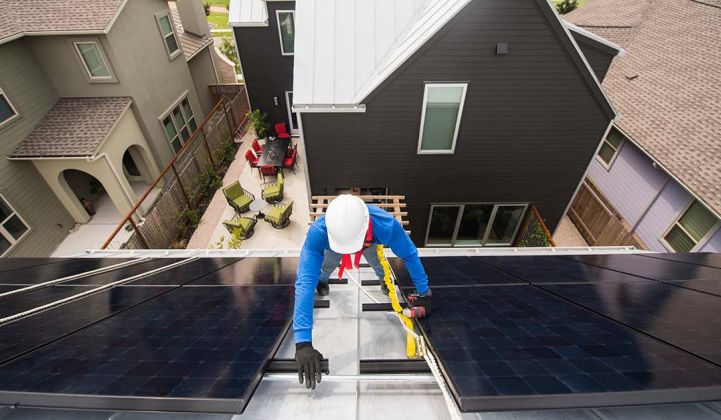SunPower announced a plan Monday to split into two companies, one focused on the U.S. distributed solar and storage market and the other on overseas PV manufacturing — with China’s Tianjin Zhonghuan Semiconductor to invest nearly $300 million into the newly formed manufacturing group.
SunPower itself will remain headquartered in Silicon Valley and continue to be led by current CEO Tom Werner. The 35-year-old company will focus on installing high-efficiency solar systems for residential and commercial customers, while expanding its offerings in batteries and other energy services for its largely North American customers.
Meanwhile, a new company known as Maxeon Solar will be formed, to be headquartered in Singapore and led by Jeff Waters, currently CEO of SunPower’s Technologies business unit.
Tianjin Zhonghuan Semiconductor (TZS), a longtime supply partner of SunPower, will make an equity investment of $298 million into the new company, allowing it to scale up production of its Maxeon 5 solar panels in Malaysia while developing its Maxeon 6 technology.
SunPower will continue leasing space at the manufacturing facilities it acquired last year from SolarWorld Americas in Oregon and sold in September*, and it will continue to conduct early-stage research into PV technology. But Maxeon Solar will take control of the remainder of SunPower’s global factories, spanning Malaysia, Mexico, the Philippines and France, effectively taking SunPower out of the manufacturing big league.
Maxeon will have an exclusive deal to supply SunPower with modules in the U.S. and Canada.
SunPower will remain a publicly listed company, and Maxeon will eventually join it in trading on the U.S.-based Nasdaq exchange. French oil and gas giant Total — SunPower’s largest shareholder since 2011 — said it intends to remain a shareholder of both companies.
"Manufacturing and downstream both have unique risk profiles, and separating the businesses out allows the two entities to optimize their investment decisions," said Ravi Manghani, head of solar at Wood Mackenzie Power & Renewables.
The announcement represents one of the biggest strategic shifts for SunPower since the U.S. solar group launched onto the public markets in 2005. It reflects the increasing maturation and specialization of the global solar market, but also the persistent weakness of SunPower's stock price amid the ongoing consolidation and commodification of the upstream PV industry.
Total invested in SunPower eight years ago at $23.25 per share, marking an important early step by an oil supermajor into the renewables business. But the shares have traded well below that price in recent years.
In a conference call Monday, SunPower CEO Werner said the split would "enhance shareholder value in the near term" while "improving the long-term profitability of both companies."
The solar industry is “entering a period of extended growth where success will be driven by value chain specialization, technology innovation and economies of scale,” Werner said. “This new structure and investment will create two focused businesses, each with unique expertise to excel in their part of the value chain."
SunPower shares were up around 4 percent to $8.70 at midday Monday on the news. The shares have fallen sharply since touching $15 in September, having started the year around $6.30.
New manufacturing giant?
SunPower plans to spin off all of its shares in Maxeon Solar to its existing shareholders, after which TZS will make its $298 million investment into the new company. That funding will give Shenzhen-listed TZS a roughly 29 percent stake in Maxeon Solar at an implied post-money equity value of $1.03 billion, with SunPower’s shareholders in control of the remainder. The deal is expected to close in the second quarter of 2020.
“As the main shareholder of SunPower, we support this transaction which will bring clarity and focus for both entities on their respective activities,” Total CEO Patrick Pouyanné said in a statement.
SunPower's revamp is the most recent among many. In 2018 the company started spinning off its utility-scale capabilities — expertise that later found a home in the creation of Terabase Energy — and this year began laying out plans to focus on energy services. That means selling more storage and pitching customers on services like demand-charge management — parts of the business that are marginal today but that Werner plans to grow.
The pivot away from manufacturing will make SunPower itself a "capex- and opex-light" business, Werner said, "with easy-to-model financials and a cash-based [profit and loss]" framework.
Meanwhile, for Maxeon Solar, the backing of TZS will come with better supplier relationships within China and greater access to the country's world-leading solar market, Waters said on the conference call.
TZS is one of the world's largest suppliers of wafers used to make semiconductors and solar cells, with about 30 gigawatts of capacity in operation.
The global solar market is entering a new growth phase, with solar now the leading source of new generation capacity in many countries, Waters noted.
"We believe this era will be characterized by significantly higher deployment rates; that high-performance technologies will become the norm rather than the exception; and that the industry will consolidate around a small group of companies that combine technology acumen, access to capital and marketing expertise."
"We intend to lead this group," Waters said.
*Correction: this article originally stated that SunPower would continue ownership of the Oregon factory it acquired from SolarWorld Americas. In September, SunPower closed a deal to sell those facilities to Ragingwire Data Centers, Inc. and is now leasing a portion of the facilities.
Additional reporting by Emma Foehringer Merchant.




